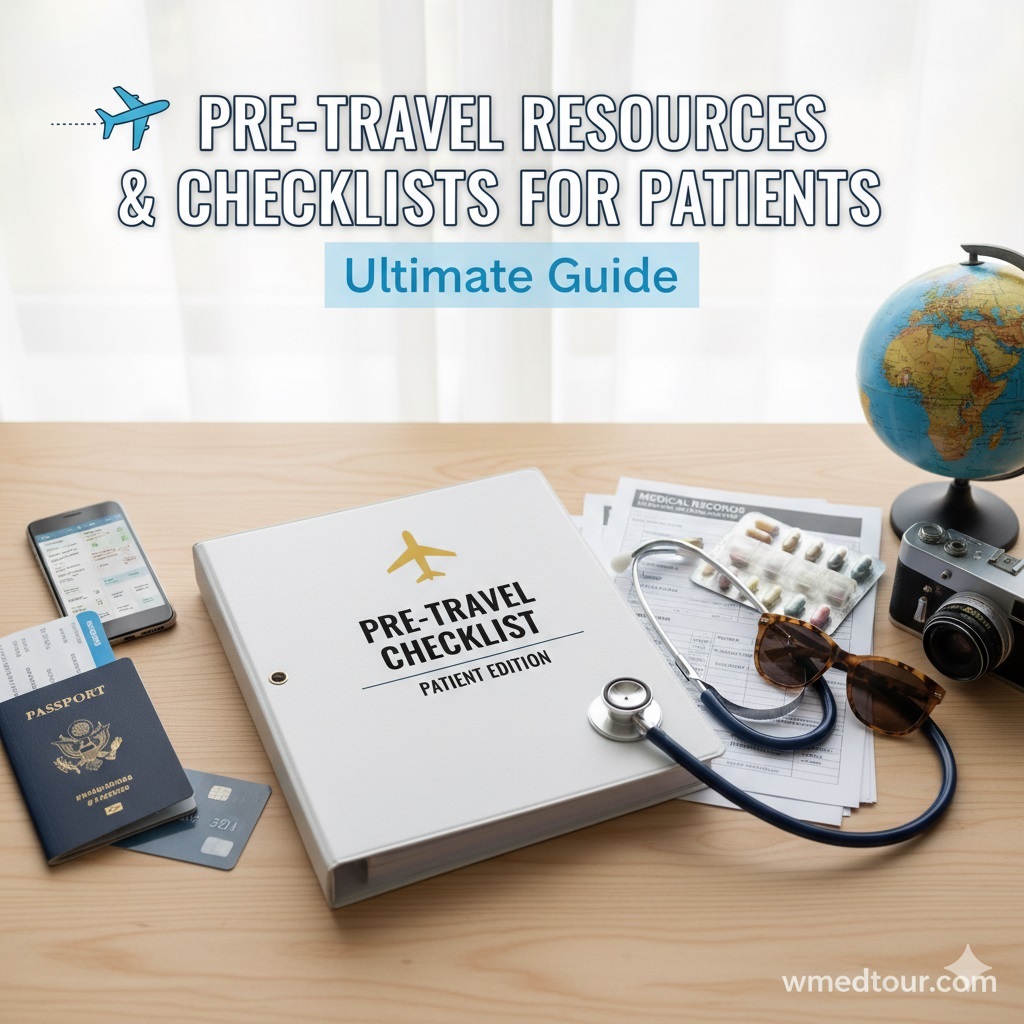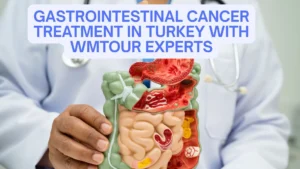Pre-Travel Resources & Checklists for Patients: Ultimate Guide ✈️
Navigate your medical journey abroad with confidence. Our definitive guide ensures you’re fully prepared, from medical records to logistical details.
💡 Executive Summary: Your Key Takeaways
Embarking on medical travel, while offering access to world-class and affordable care—like affordable hip replacement surgery—demands rigorous preparation. This ultimate guide distills the complex process into simple, actionable steps. We stress that diligent pre-travel planning is not just about logistics; it’s a critical component of your overall medical safety and success. Therefore, our guide emphasizes three core areas:
- Medical Clearance: Obtain a detailed medical summary, medication list (with generic names), and a “fitness to fly” certificate from your local physician.
- Logistical Fortification: Secure comprehensive travel and medical evacuation insurance, ensuring your coverage is explicit for international medical procedures.
- Documentation Mastery: Have all passports, visas, and appointment confirmations meticulously organized, preferably both digitally and physically.
A well-executed **Pre-Travel Resources & Checklists for Patients** strategy drastically reduces risks and enhances your recovery experience.
The decision to seek medical treatment abroad, whether for advanced oncology options like TCR T-Cell Receptor therapy or complex procedures like cardiac EPS/RFA ablation, is a monumental one. While the allure of lower costs, reduced wait times, and cutting-edge technology in countries like Turkey, Iran, or India is compelling, the journey itself is multi-phased. Consequently, the preparation phase—utilizing comprehensive **Pre-Travel Resources & Checklists for Patients**—is arguably the most critical step in safeguarding your health and investment. This is where success is engineered, long before you step onto the plane.
Indeed, countless patients successfully navigate this process annually. However, those who face avoidable complications often cite inadequate preparation as a key factor. Therefore, we’ve developed this definitive, authoritative guide to ensure your readiness is absolute. We aim to empower both individuals and professional facilitators with the structured information necessary for a seamless and secure medical travel experience.
—
👤 Who is This For? 🩺
This ultimate guide, focusing on **Pre-Travel Resources & Checklists for Patients**, serves a dual audience, ensuring every stakeholder in the medical travel ecosystem is fully informed:
👨👩👧👦 Individuals and Families
If you or a loved one are preparing for any international medical procedure—ranging from elective surgeries like breast augmentation or rhinoplasty in Iran to essential treatments like proton therapy for cancer—this is your operational blueprint. You need to understand the granular detail of what is required to travel safely, undergo treatment, and return home for recovery. Neglecting this meticulous planning can translate directly into stress, financial loss, or, most importantly, medical risk. This resource simplifies the complexity, transforming overwhelming requirements into manageable steps. Furthermore, for procedures like fertility preservation or PGT fetal gender selection, specific preparation regarding legal and ethical documentation is paramount.
🏢 Professionals and Facilitators
Medical tourism facilitators, travel agents specializing in medical trips, and corporate health planners will find this a gold-standard reference. It offers a structured approach to counseling clients, standardizing your service offerings, and mitigating liability. A professional’s ability to provide a complete **Pre-Travel Resources & Checklists for Patients** is a key differentiator in a competitive market. Use this to ensure compliance, from verifying global medical treatment regulations to vetting the surgical team (a critical step detailed in choosing a surgeon abroad checklist).
—
📋 The Essential Medical Preparation Checklist 📝
Medical preparation begins weeks, or even months, before your departure date. This section provides the non-negotiable medical steps you must complete.
📄 1. Comprehensive Medical Records & Summary
You must compile a complete, recent medical history to share with the foreign medical team. This avoids delays and ensures the treating physicians fully understand your current health status. As Johns Hopkins Medicine advises, a physician’s letter is essential. (Source 1)
- Medical History Letter: A letter from your primary care physician (PCP) or specialist detailing your diagnosis, treatment history, allergies, and current health status.
- Test Results: Recent blood tests, pathology reports, and imaging scans (MRI, CT, X-ray). Ensure these are digital and easily shareable, as is often required for advanced treatments like TIL therapy or Lu-177 theranostics.
- Generic Medication List: A list of all prescriptions, over-the-counter medications, and supplements. Critically, use the **generic names**; foreign pharmacies may not recognize US or local brand names.
- Allergy Details: A clear list of drug, food, and environmental allergies. Consider a **Medical Alert Bracelet** for severe, life-threatening allergies.
✅ Pros of Meticulous Medical Documentation
- Optimized Treatment: Foreign doctors can plan the surgery (e.g., Total Knee Replacement) or treatment more efficiently.
- Safety Assurance: Minimizes the risk of drug interactions or allergic reactions.
- Faster Consultations: Reduces time spent in the host country on redundant tests.
❌ Cons of Poor Documentation
- Treatment Delays: The foreign clinic may require new tests, delaying your procedure.
- Increased Cost: Paying out-of-pocket for repeat tests abroad.
- Communication Breakdown: Risk of misdiagnosis or inappropriate treatment due to incomplete history.
💉 2. Immunizations & Destination Health Advisories
Your destination’s unique health risks must be addressed. A travel medicine specialist can provide personalized advice based on your itinerary, as highlighted by the NIH. (Source 2)
- Routine Vaccines: Ensure standard vaccinations (Tetanus, MMR, Flu) are up to date.
- Travel Vaccines: Depending on the country (e.g., in a guide to medical tourism in India), you may need Yellow Fever, Typhoid, or Hepatitis A/B shots.
- Medication Supply: Pack an adequate supply of all prescription medicines, plus a minimum of 1-2 weeks extra in your carry-on luggage, as recommended by the US Department of State. (Source 3)
- Prescription Documentation: Carry a copy of the prescription and the doctor’s note explaining your need for the medication, especially for controlled substances, as foreign customs laws can be very strict.
—
💻 Pro-Cons of Telemedicine in Pre-Travel Preparation
In the age of digital health, virtual consultations play a vital role in the preparation phase. Telemedicine offers both incredible convenience and some unique challenges for a smooth medical journey. It’s especially useful for vetting specialists before committing to a country like those detailed in our plastic surgery guide for UAE, Turkey, and Iran.
| ➕ Pros (The Advantages) | ➖ Cons (The Challenges) |
|---|---|
| Direct Doctor-Patient Vetting: You can interview a surgeon—such as one specializing in robotic cancer surgery—before travel. | Limited Physical Assessment: Crucial aspects, like skin elasticity for a tummy tuck or joint mobility for a replacement, can be missed. |
| Cost & Time Efficiency: Saves money and time on preliminary in-person consultations. | Technological & Privacy Risks: Issues with internet stability and ensuring HIPAA/GDPR-compliant transmission of sensitive medical records. |
| Better Informed Consent: Allows for multiple, unhurried sessions to understand the procedure, risks, and recovery (e.g., hair transplant recovery timeline). | Miscommunication & Language Barriers: Dependence on translators or the doctor’s English proficiency can lead to critical misunderstandings. |
| Facilitator Coordination: Streamlines the sharing of medical images and reports among multiple specialists and facilitators. | Regulatory Ambiguity: The legal standing of a telemedical diagnosis or consent across international borders can be complex. |
—
💰 Financial & Insurance Preparation: Securing Your Investment 🏦
Addressing the financial and insurance aspects of medical travel is a cornerstone of any effective **Pre-Travel Resources & Checklists for Patients** plan. Your primary concern must be unexpected costs.
🛡️ 1. Comprehensive Insurance Coverage
Regular health insurance typically does not cover elective procedures abroad. **You must secure travel insurance that includes medical evacuation.**
- Medical Travel Insurance: A policy specifically designed to cover complications arising from the procedure itself. The complexity of procedures like Total Hip Replacement or CABG surgery means unexpected complications are a real possibility.
- Medical Evacuation: This is non-negotiable. If a severe complication occurs, you need a pre-arranged and funded way to be transported to a higher-level facility or back to your home country. This can cost tens of thousands of dollars without coverage. The US Department of State explicitly recommends this. (Source 4)
- Emergency Funds: Have a plan for quick access to a substantial emergency fund, such as a credit card with a high limit, to cover unforeseen expenses like extended hospital stays.
💵 2. Financial Planning and Contracts
Before any transfer of funds, secure legally binding contracts.
- Service Agreement: A detailed contract from the hospital or facilitator that outlines all services included (surgery, hospital stay, medications, transfers) and excluded services.
- Total Cost Breakdown: An itemized quote that explicitly states what happens if you need an extended stay (e.g., for recovery from kidney transplant or a lengthy hair transplant recovery).
- Payment Method: Confirm the accepted payment methods and currency exchange rates. Beware of carrying excessive cash, as many countries, including Turkey (Turkey’s Medical Tourism Guide), have regulations on cash importation.
For more specific financial preparation in other fields, consider reviewing resources like cost of fetal gender selection 2025 or cost of liposuction in Dubai.
—
🧳 The Logistics & Documentation Checklist 💼
Beyond the medical and financial aspects, successful medical travel is fundamentally dependent on solid logistics and documentation, a key element of the complete **Pre-Travel Resources & Checklists for Patients**.
🛂 1. Travel Documents & Visa Requirements
Start this process immediately. Visa application wait times can be extensive.
- Passport Validity: Ensure your passport is valid for at least six months beyond your return date.
- Visa/Entry Permit: Research and obtain the necessary visa. Some countries offer a special medical visa. For instance, traveling to a location like Dubai for plastic surgery might have different rules than a country like Iran.
- Confirmed Itinerary: Printouts of your round-trip flights, hospital booking, and accommodation details.
🏠 2. Accommodation and Ground Transportation
Your recovery environment is crucial to the overall success of your trip.
- Recovery Housing: Book accommodation near the clinic/hospital that is comfortable, accessible (ground floor or elevator), and appropriate for your post-operative state. For example, after a TKR, a ground-floor unit is ideal.
- Airport Transfer: Pre-arrange your transfer. Depending on the procedure (e.g., after rhinoplasty in Turkey, where nasal congestion may be a concern, or after major lung cancer treatment in Iran), you may need a medical or private vehicle for comfort.
- Local Contacts: Have the phone numbers of your facilitator, surgeon, and the local embassy/consulate. Consider enrolling in your government’s traveler safety program (e.g., the US STEP program). (Source 5)
When you focus on the comprehensive **Pre-Travel Resources & Checklists for Patients**, you move from being a simple patient to a proactive participant in your own healthcare. This diligence is what separates a successful medical journey from a stressful ordeal. Remember that your choice of destination often dictates the preparation complexity; research specific regulatory guides like Iran’s Medical Travel Regulations or Turkey’s Regulations.
—
🚶♀️ Hypothetical Patient Journey: Maria’s Hip Replacement in Turkey 🇹🇷
To illustrate the practical application of a robust **Pre-Travel Resources & Checklists for Patients**, consider the case of Maria, a 65-year-old from the UK seeking a total hip replacement (THR).
📅 Pre-Travel (8 Weeks Out)
- Research & Selection: Maria researched top orthopedic surgeons using WMedTour, focusing on a highly-rated, JCI-accredited hospital in Istanbul, which offered excellent post-operative care and a package covering THR.
- Medical Clearance: Her UK GP sent her X-rays and a medical history letter to the Istanbul clinic. The Turkish surgeon held a telemedicine consultation with Maria and her GP to discuss the surgical plan.
- Insurance & Financial: Maria purchased specialized medical travel insurance covering a 30-day extended stay and emergency air ambulance. She finalized her fixed-price contract with the hospital.
- Logistics: She booked a serviced apartment next to the hospital for her two weeks of post-op physical therapy, ensuring it had a walk-in shower and ramp access.
- Keyphrase Use: She meticulously followed her **Pre-Travel Resources & Checklists for Patients** to organize all her documents.
✈️ Travel & Arrival
- Documents: Maria carried her Turkish e-visa, her PCP’s letter explaining her need for painkillers (generic names listed), and all health insurance details.
- Arrival: A dedicated hospital driver met her at Istanbul Airport and took her directly to the hospital for pre-operative consultations.
🏥 Treatment & Recovery
- Surgery & Stay: The THR was successful. Maria stayed five nights in the hospital, followed by two weeks in the serviced apartment with a visiting physiotherapist arranged by the hospital.
- Post-Op Care: Before leaving Turkey, the surgeon gave her a final ‘fit to fly’ certificate and detailed discharge instructions.
🏡 Return Home (The “Next Steps” Checklist)
- Maria had already contacted her UK GP, providing them with the Turkish surgeon’s operative report and post-operative plan to ensure seamless transition of care, a crucial step often forgotten in the **Pre-Travel Resources & Checklists for Patients** process. This proactive step prevents complications and ensures her local follow-up is appropriate.
This case exemplifies how a well-structured **Pre-Travel Resources & Checklists for Patients** ensures every phase is covered, minimizing stress and maximizing the chance of a successful outcome.
—
🗺️ Comparing Medical Tourism Destinations: Preparation Complexity 🌍
The complexity of your preparation often correlates with the destination’s regulatory environment and the type of treatment. Below is a comparative table of popular destinations in the medical tourism landscape, helping you tailor your **Pre-Travel Resources & Checklists for Patients**.
| Destination | Typical Procedure Focus | Visa Complexity | Medical Record Translation Need | Recommended Internal Link for Deep Dive |
|---|---|---|---|---|
| Turkey 🇹🇷 | Hair Transplant, Aesthetic Surgeries, Cardiac Surgery | Low (e-Visa common) | Low (Many facilities are English-speaking) | Turkey’s Legal Regulations |
| Iran 🇮🇷 | Rhinoplasty, Oncology, Neurosurgery | Moderate (Requires application, may need escort) | Moderate (Essential for specialized oncology, e.g., Neuro-Oncology) | Iran’s Legal Regulations |
| India 🇮🇳 | Cardiac, Transplant, Orthopedics | Moderate (Medical Visa required) | Low (High English proficiency in top hospitals) | India Medical Travel Regulations |
| South Korea 🇰🇷 | Aesthetics, Advanced Cancer (CAR-T) | Low to Moderate (K-ETA or Visa) | High (Professional translation highly recommended) | South Korea Regulations |
This comparison underscores the need for a customized **Pre-Travel Resources & Checklists for Patients** based on the specific requirements of your chosen destination and procedure, from orthopedic surgery to complex gender confirmation surgery.
—
❓ FAQs: Your Most Asked Questions About Medical Travel Preparation 🤔
We’ve compiled answers to the most frequent and important questions patients and professionals ask, ensuring all aspects of the **Pre-Travel Resources & Checklists for Patients** are covered.
❓ 1. Is a ‘Fit to Fly’ certificate mandatory?
A ‘Fit to Fly’ certificate, issued by your treating physician (home or abroad), is not always legally mandatory but is highly recommended, especially after major surgery like heart bypass surgery or an invasive procedure. It confirms you are medically stable enough to withstand the cabin pressure changes and limited mobility of air travel. Airlines may refuse boarding if you appear unwell or have recently had a complex surgery like implant removal surgery.
❓ 2. Should I pack extra medication in my checked luggage?
No. The definitive advice is to keep all essential and prescription medications in your **carry-on bag**. Checked luggage can be lost, delayed, or subject to theft. You must have a full supply of medication (plus extra) for your entire trip with you at all times. This is vital, especially for critical medications such as those needed after kidney transplant surgery or for managing chronic conditions like diabetes (diabetes treatments abroad).
❓ 3. How far in advance should I start preparing?
For elective or cosmetic procedures, start at least **6-8 weeks** in advance. For complex treatments like oncology (advanced cancer treatment) or those requiring pre-travel diagnostics, start **3-6 months** out. This allows ample time for visa processing, obtaining thorough medical records, and arranging travel-specific vaccines.
❓ 4. What is the difference between travel insurance and medical travel insurance?
Traditional travel insurance primarily covers flight cancellation, lost luggage, and accidental injury/illness unrelated to your medical procedure. **Medical travel insurance** is specifically designed to cover complications, necessary follow-up care, and medical evacuation directly related to the elective surgery or treatment you traveled for. You need both, particularly the latter.
❓ 5. Should I translate my entire medical history?
You only need to translate the **comprehensive medical summary letter** from your home physician and any key, recent diagnostic reports (e.g., pathology for breast cancer treatment) into the host country’s language, or a globally recognized language like English. The host facility’s medical tourism department often assists with this if the original records are in a language they can’t manage.
❓ 6. How can I verify the accreditation of the foreign hospital or clinic?
Look for internationally recognized accreditations. The **Joint Commission International (JCI)** is the global gold standard. Additionally, check for national accreditations or affiliations with university hospitals. Your choosing a surgeon abroad checklist should prioritize this verification process.
❓ 7. What if I experience a medical complication after I return home?
The **Pre-Travel Resources & Checklists for Patients** must include a detailed post-operative plan. Before you leave the host country, you need a discharge summary, follow-up instructions, and a contingency plan. Inform your local PCP about the procedure and provide them with the surgeon’s contact information. Reputable medical tourism facilitators, such as those that guide you through global medical tourism, will have established protocols for handling remote complications.
❓ 8. Are there any restrictions on what I can pack in my first aid kit?
Yes. While a basic first-aid kit is essential, check the host country’s customs regulations for specific over-the-counter medications. Certain common ingredients (like pseudoephedrine in some cold medicines) are controlled or banned in some nations, as noted by the US Department of State. Always leave prescription medicines in their original, labeled containers.
❓ 9. How do I handle currency and payments safely?
Avoid carrying large amounts of cash. Use a combination of a secure international credit card and a small amount of local currency. Notify your bank and credit card companies of your travel dates and destination (e.g., Istanbul, Tehran) to prevent fraud alerts or transaction freezes.
❓ 10. Does a companion need special travel documents?
Generally, a companion needs the standard travel documents (passport, visa). However, for specific medical categories—such as those traveling for pediatric oncology or a kidney transplant, where a prolonged stay is expected—their visa and accommodation planning should be just as meticulous as the patient’s.
❓ 11. Can I use my home country’s mobile phone and data plan abroad?
Relying on expensive international roaming is risky and costly. A better option for communication, particularly for crucial pre- and post-operative contact, is to purchase a local SIM card upon arrival or an international eSIM. Ensure you have the hospital’s and facilitator’s numbers readily available, along with emergency contact information like those listed in our Best Heart Specialist Dubai guide.
❓ 12. What is a “convalescence phase” and how do I prepare for it?
The convalescence phase is the period of recovery following the procedure. Preparation includes securing appropriate, accessible accommodation, planning for dietary needs, and ensuring all necessary mobility aids (e.g., crutches, wheelchair) are ready. A proper **Pre-Travel Resources & Checklists for Patients** accounts for the full duration of the recovery, not just the hospital stay.
—
✅ Final Takeaway: The WMedTour Commitment
At WMedTour, we understand that successful medical tourism hinges on a thorough and stress-free preparation. Our commitment is to ensure your journey is seamless from the moment you consider treatment for gallbladder disease or a complex THR. By utilizing this ultimate guide and adhering to your personalized **Pre-Travel Resources & Checklists for Patients**, you take control of your health journey. Remember, diligence now pays dividends in peace of mind and positive outcomes later.
Ready to start your medical journey with confidence? Explore our specialist departments, such as Oncology, Plastic Surgery, or Gynecological Surgery, and let us guide your preparation.
Further readings on key preparation areas:
- For hair restoration planning: Eligibility for Hair Transplant and Choosing the Safest Hair Transplant Destination.
- In-depth look at surgical specifics: Gender Confirmation Surgery Guide and Sinus Endoscopy.
- Cost and Quality comparisons: Global Price Comparison for Robotic Surgery and Heart Surgery Costs 2025.
- Understanding ethical considerations for procedures: Intersex Surgeries Ethical Guide.
- For advanced diagnostics: Preventive Health Checkups and Cardiac Checkup Packages.
- General Medical Tourism Guidance: Ultimate Guide to Medical Tourism Surgery.




